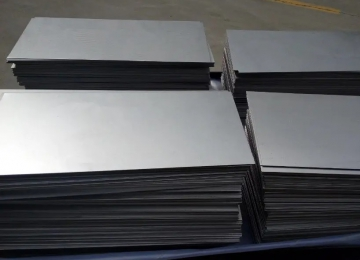
Grade 16 titanium alloy (Ti-0.05Pd) is a compound with good physical/mechanical properties and corrosion resistance.
gold. It is similar in performance to the TA9 alloy, but has added palladium to improve its corrosion resistance. Grade 16 has good formability, is easy to weld, and has good toughness. It exhibits high corrosion resistance in highly oxidizing and slightly reducing environments. This alloy is commonly used for casting valves and fittings.
Chemical composition of titanium alloy Grade 16 (%)
Fe | C | Si | Cu | N | Zr | Al | Sn | H | O | Other single | Total other | Ti |
≦0.3 | ≦0.1 | ≦0.15 | 2.5-3.2 | ≦0.05 | 1- 1.5 | 4.5-5.5 | 2-3 | ≦0.015 | ≦0.15 | ≦0.1 | ≦0.4 | margin |
Physical properties of titanium alloy Grade 16
résistance à la traction | 485 Mpa |
Limite d'élasticité | 350 Mpa |
Poisson’s ratio | 0.34-0.40 |
Module d'élasticité | 103 Gpa |
Elongation 50 mm(A5) | 28% |
hardness(HV) | 150 |
Performance characteristics of titanium alloy Grade 16
Titanium alloy Grade 16 has the following performance characteristics:
Lightweight: Titanium alloy Grade 16 is a lightweight alloy with a density close to aluminum and about 40% lower than steel. Therefore, the use of Grade 16 alloy can achieve lightweight design of the structure and reduce weight load.
Good corrosion resistance: Grade 16 alloy has extremely strong corrosion resistance and can be used for a long time in seawater, acid and alkali solutions and other corrosive media without damage. This makes Grade 16 alloy widely used in marine, chemical and petroleum fields.
Resistance to hydrogen absorption: Grade 16 alloy has a high resistance to hydrogen absorption, which can effectively prevent hydrogen from penetrating and damaging the material. This makes Grade 16 alloy advantageous in applications under high temperature, high pressure, and hydrogen environments, such as petrochemical and hydrogen energy fields.
Good mechanical properties: Grade 16 alloy has good strength and toughness and can withstand large loads and impacts. At the same time, it also has good formability, is easy to process and form, and is suitable for manufacturing various complex shapes.
Heat resistance: Grade 16 alloy has high heat resistance and can maintain stable performance in high temperature environments. This makes it widely used in aerospace, aircraft engines and high-temperature processes.
To sum up, titanium alloy Grade 16 has the characteristics of lightweight, strong corrosion resistance, high resistance to hydrogen absorption, good mechanical properties and heat resistance. These characteristics make Grade 16 alloy have broad application prospects in many fields.
Welding of Titanium Alloy Grade 16
Titanium alloy Grade 16 has good welding properties. Since it is a single-phase material, it is not affected by heat treatment or welding temperature during welding, which makes welding easier. When welding, it is necessary to select appropriate welding methods and welding materials to ensure the quality and strength of the welded joint. Common welding methods include argon arc welding, electron beam welding and laser welding. In addition, attention needs to be paid to controlling the heat input and atmosphere during welding to avoid excessive oxides and inclusions.
Annealing of Titanium Alloy Grade 16
For the annealing process of titanium alloy Grade 16, the following steps can generally be followed:
Annealing temperature: Heat the material to 650-760°C (1202-1400°F) for 6 minutes to 2 hours.
Cooling method: Air cooling is used for cooling.
If you need to relieve stress in the material, you can do the following:
Annealing temperature: Heat the material to 480-595°C (896-1103°F) for 15 minutes to 4 hours.
Cooling method: Air cooling is also used for cooling.
The annealing process can help restore the material’s grain structure and relieve internal stress, thereby improving the material’s mechanical properties and corrosion resistance. Please note that before performing annealing operations, you should first understand the specific material properties and process requirements, and follow professional operating instructions.
Applications of Titanium Alloy Grade 16
Titanium alloy Grade 16 has a wide range of applications due to its light weight, strong corrosion resistance and resistance to hydrogen absorption. Here are some common applications for Grade 16 alloy:
Petroleum Industry: Grade 16 alloy is widely used in the petroleum industry for components such as offshore platforms, oil well equipment, pipelines and valves. Due to its good corrosion resistance, it can be used for a long time in seawater and corrosive environments.
Chemical industry: Grade 16 alloy is used in the chemical industry to manufacture chemical equipment, reactors, storage tanks and pipelines, etc. It can resist the erosion of many corrosive media and has excellent corrosion resistance.
Metallurgical industry: Grade 16 alloy is used in the metallurgical industry to manufacture corrosion-resistant equipment and tools, such as smelting furnaces, smelting tanks and casting molds.
In addition to the above application fields, Grade 16 alloy can also be used in aerospace, automobile manufacturing, medical equipment and marine engineering and other fields. In summary, Grade 16 alloy is widely used in various industrial fields due to its excellent corrosion resistance and lightweight properties.

